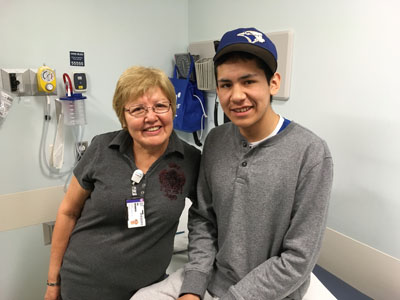More than words: interpreter maintains strong ties to her community

June 21 is National Aboriginal Day, a day for all Canadians to recognize and celebrate the unique heritage, diverse cultures and outstanding contributions of First Nations, Inuit and Métis peoples. The Montreal Children’s Hospital Northern and Native Health Program has provided care and services to Quebec’s First Nations communities for more than two decades. For many families who come to Montreal – and to the Children’s – their hospital visits are made easier with support from people like Eva Saganash, an interpreter who works for the Cree Health Board, which provides health and social services to communities of the Cree Territory of James Bay.
Eva is originally from Waswanipi, and has lived and worked in Montreal since she was in her 20s. She came to work for the Cree Health Board later in her career. “I had worked for a large company before that, but when my job was eliminated, I thought it was time to think about working with my Cree people,” she says. “Eventually, a friend suggested I apply to the Cree Health Board.” She began working in the offices but within several years was asked if she’d like to work as an interpreter. “My first thought was ‘that would be completely different’, and then I thought, why not try it?” she says.
Learning by doing
“With interpreting, you learn by doing, and Daisy Benjamin, who recently retired, trained me when I first came to the Children’s,” says Eva. In recent years, Eva has worked primarily with Cree patients at the Royal Victoria Hospital, but she still occasionally works with families at the Children’s. “The older people need interpreters for their medical appointments because they generally don’t speak English or French,” she says. And although most young families speak English or French, Eva’s help is sometimes very welcome. “There was one woman I met who spoke English, and after giving her some basic information about tests and paperwork, I got up to leave,” says Eva. “But she asked me to stay because she was nervous and wanted to make sure she really understood everything the doctor said. So sometimes our role involves figuring out what the patients are thinking and feeling, not just what they’re saying.”
When asked if she likes her work, Eva answers, “I love it.” A few years back, she had a short-lived retirement, but didn’t hesitate a moment when asked if she’d like to return to work. “I don’t want to be sitting at home just staring at the walls or watching TV,” she says. “My work lets me meet new people all the time. I’ve even met people who I went to high school with but haven’t seen since. They’ll say, ‘I heard you were in Montreal but I didn’t know you’re doing this!’ It’s always nice when that happens.”


